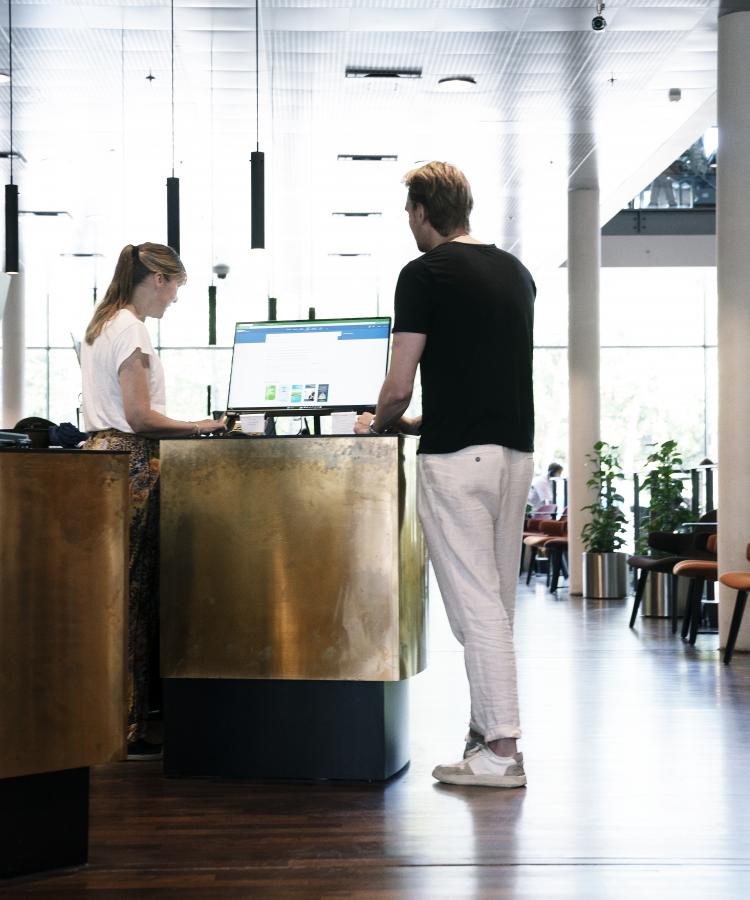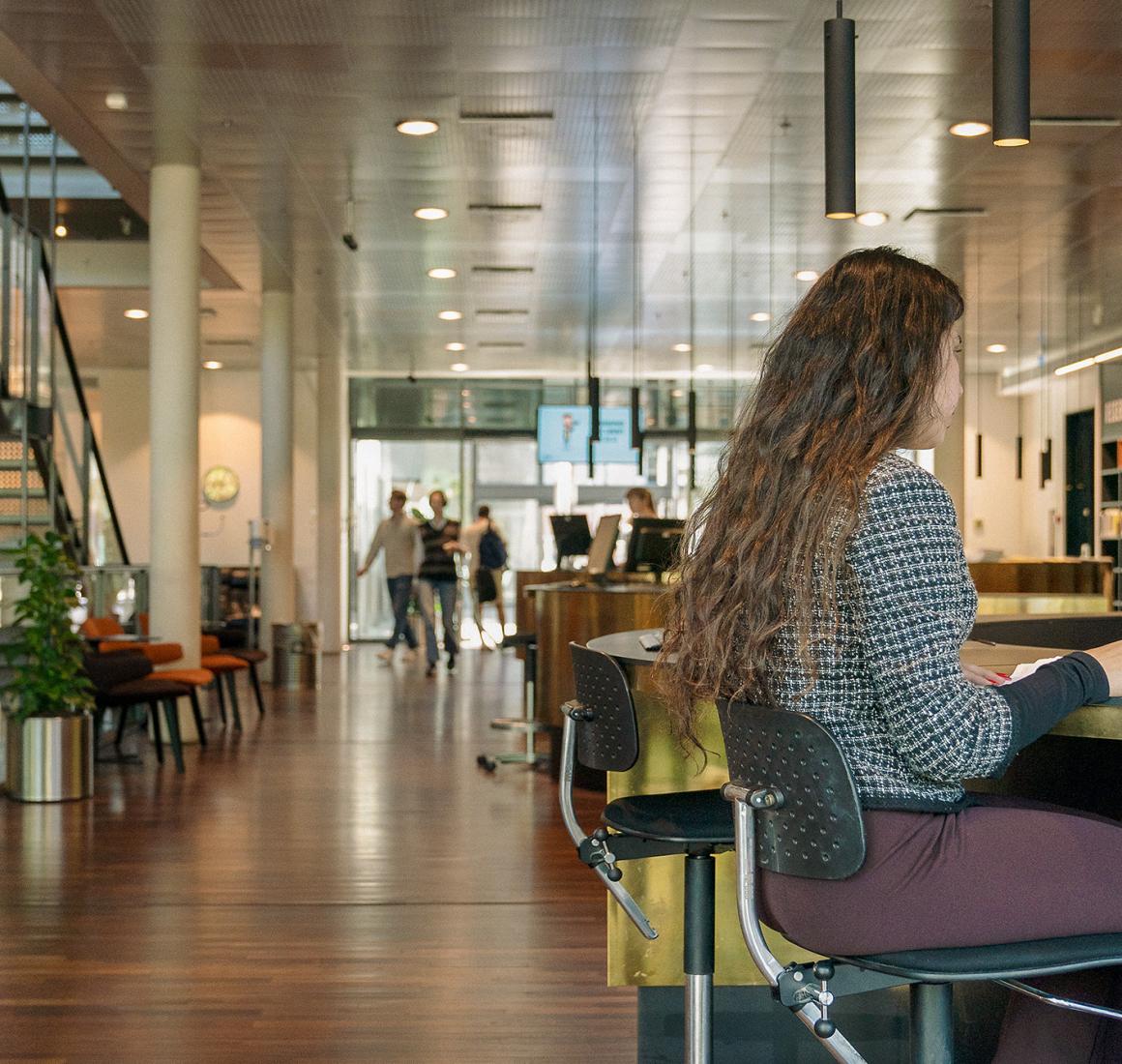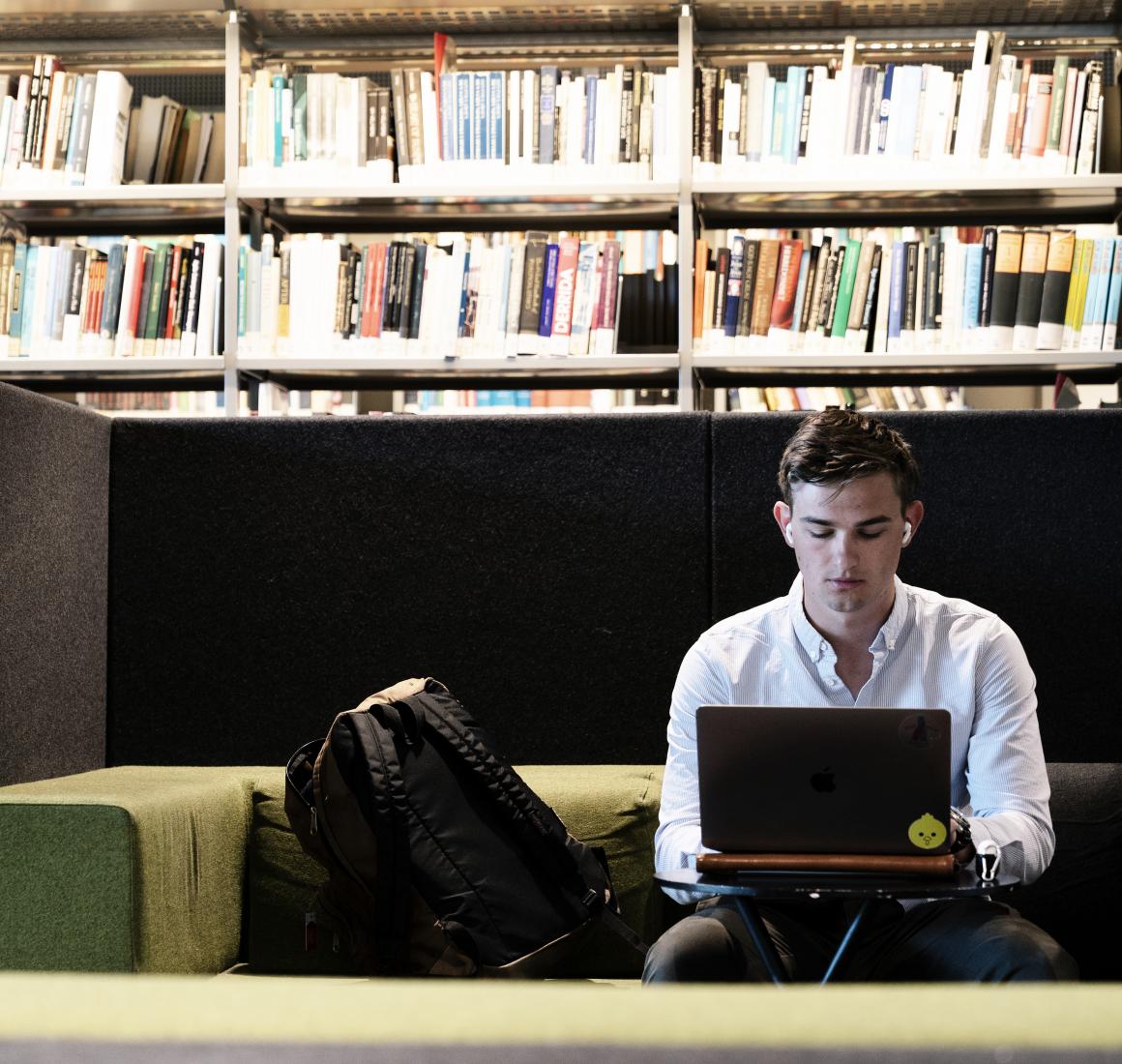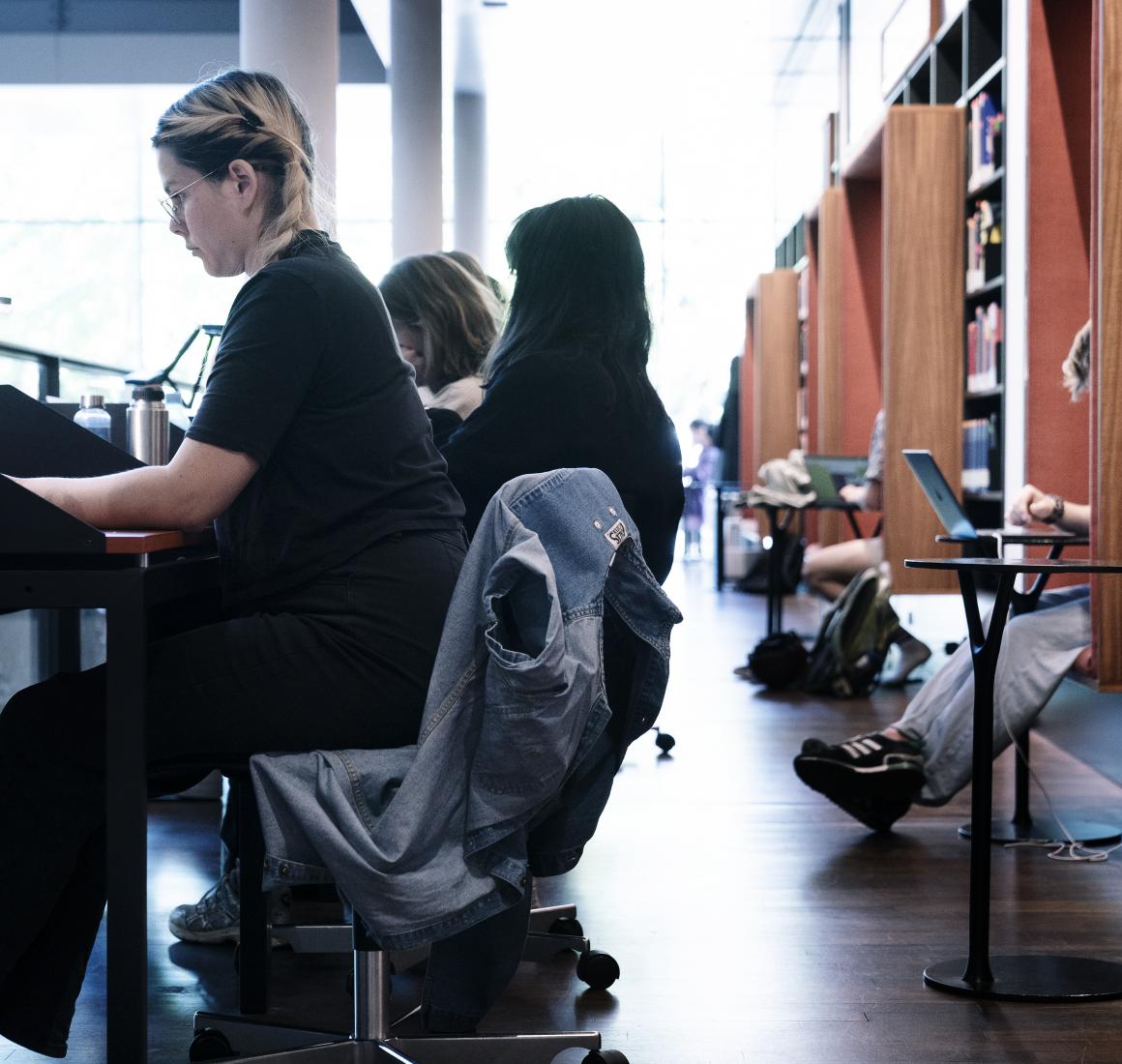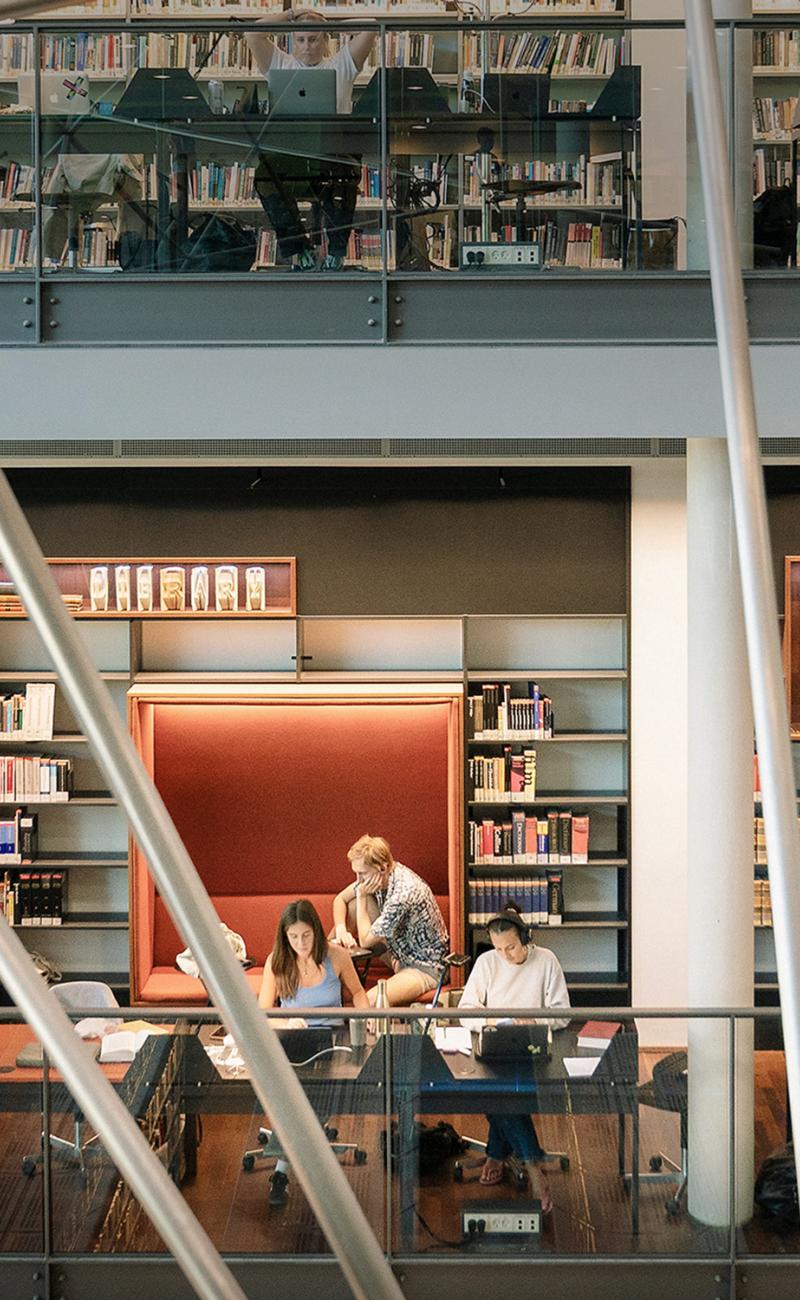
Library
Open to everyone – every day of the week. The library at CBS is open to the public, and everyone interested in the social sciences, economics and politics is welcome.
Space for study and research
At the library, we focus on all aspects of education and research at CBS. We offer inspiring study environments, an extensive collection of literature and information, as well as guidance for citizens, students and researchers.
612 study seats
160 online resources
30 information specialists
Everyone can use the library at CBS
Whether you are a CBS student or studying elsewhere, an upper secondary school student preparing your SRP/SOP project, or simply a curious citizen, you are welcome.
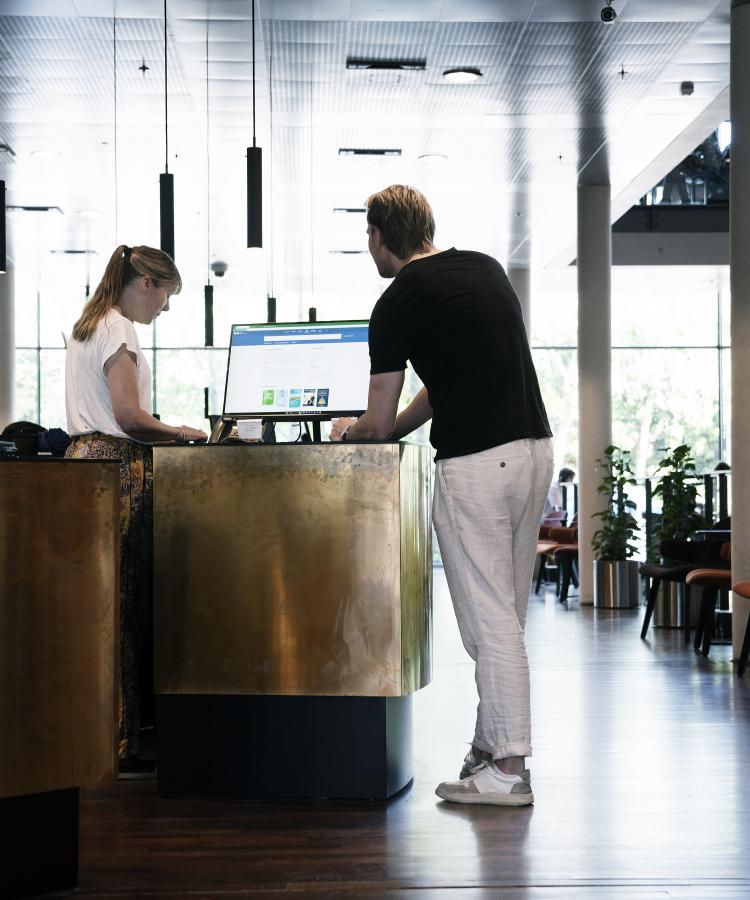
Use the library space
Experience the atmosphere of a dynamic university library and use the areas for studying, reading newspapers or simply taking a break in beautiful surroundings.
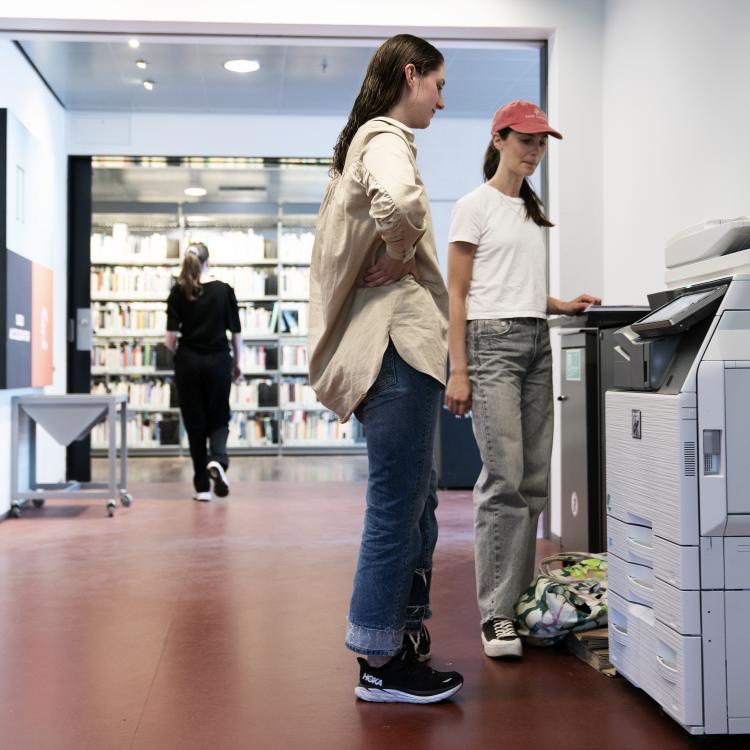
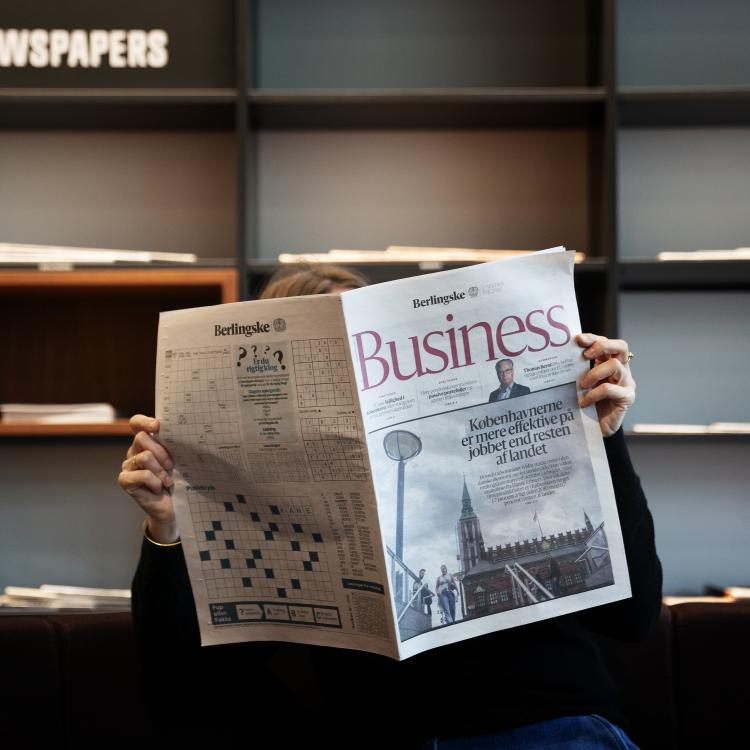
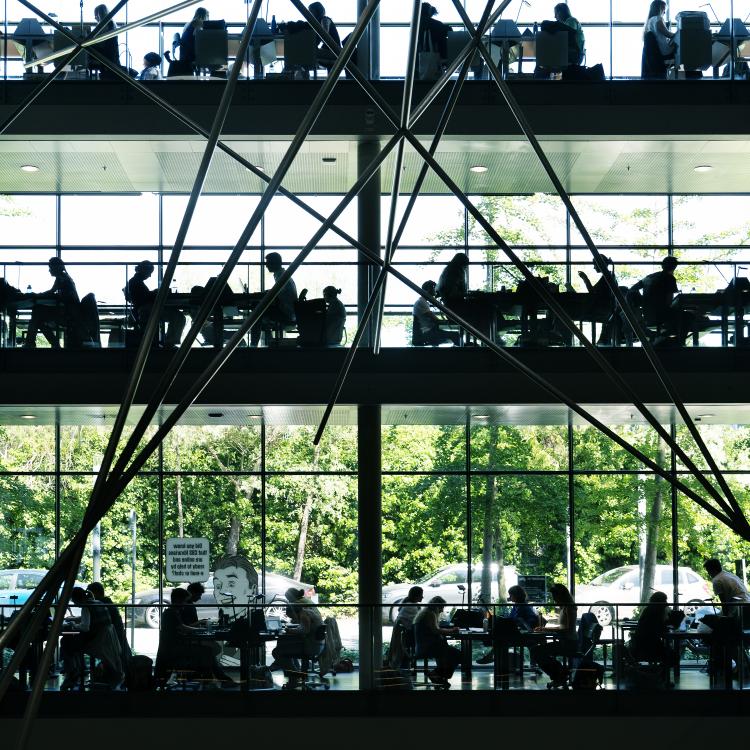
Already part of CBS?
Search the library
Depending on your needs, the library offers sources that can help you find what you are looking for. You can locate physical books on the shelves and digital materials through the many online resources we subscribe to.
About us
Library Management
CBS Library & Academic Services is managed by Library Director René Steffensen and consists of four departments.
Library Director
René Steffensen
Phone: +45 3815 3700
Email: rs.libas@cbs.dk
Download CV
Administration
Anita Bodin is Secretary to the Management
Phone: +45 3815 3705
Email: ab.libas@cbs.dk
Department for Collections and Processes
Anette Koll is Deputy Head of Library and Head of Department
Phone: +45 3815 3682
Email: ako.libas@cbs.dk
Department for Facilities & Dissemination
Inger Berling Hyams is Head of Department
Phone: +45 3815 3701
Email: ih.libas@cbs.dk
Department for Data & Research Services
Claus Rosenkrantz Hansen is Head of Department
Phone: +45 3815 3709
Email: crh.libas@cbs.dk
Strategy
Strategy Paper CBS Library 2025
Our DNA
CBS Library & Academic Services is the university library for Copenhagen Business School as well as a subject library open to the public.
With roots extending back to 1922, the library has successfully and with integrity developed from a small book collection to a modern library and knowledge centre. As a library, we support education and learning as well as research and knowledge dissemination.
Our legitimacy lies in our ability to deliver relevant resources and services and in our role as a relevant partner for our users and stakeholders.
At its heart, the library operates on the time-honoured principle of good governance: order on the shelves, order in the catalogue, order in service deliveries, and respectful dialogue.
Mission
What we do
The main purpose of CBS Library is to provide reliable, curated information and data in print and digital formats. We also deliver dedicated IT systems to support the use of these formats.
We provide advisory, teaching, and dissemination services within CBS areas of activity. Similarly, we deliver physical facilities that support CBS learning and dissemination activities.
Today, we support all disciplines relevant to a major social science university.
Vision
What we aspire to
CBS Library’s ambition is to be a key partner for students, staff, and citizens alike in the advancement of academic quality at CBS and societal development.
We assume co-responsibility for upholding CBS’s reputation as a recognised business school and a proactive stakeholder in society.
We promote intellectual curiosity and foster democratic, academically based discourse, thus supporting research, education, and learning in society.
Our overall aim is to achieve the following two goals:
- We help promote academic progress and success for CBS students and researchers
- We disseminate research and knowledge to CBS stakeholders and the wider world.
Values
What we build our culture on
Openness: We are accessible, open to new ideas and committed to sharing knowledge. We involve our users, partners, and stakeholders. We also work hard to ensure that knowledge, learning, and research are freely available and accessible to all our users in accordance with Open Science principles and through access to relevant resources and services.
Expertise: We adopt a professional approach to all tasks where theoretical knowledge and practical skills are key. We perceive our operation as a solid craft that is based on practical experience and knowledge-sharing combined with prioritisation of relevant skills.
Credibility: We strive to be a reliable source of high-quality knowledge and information. Our services and resources are based on professional standards and integrity so that our users can rely on us in their academic endeavours.
Well-being: We support well-being and personal development and provide opportunities for everyone to realise their full potential and contribute positively to the community. We value diversity and work actively to create an environment where everyone feels included and respected.
Principles
What we work by
Service: We put our users’ needs at the centre of everything that we do and every decision we make. This means that we invite feedback and always seek to improve the user experience. Our service principle also ensures that users perceive their interactions with the library as positive and helpful.
Quality: Our focus on precision and conscientiousness ensures high quality in every aspect of our work. We are committed to improving our own performance to meet the expectations of others.
Innovation: We encourage dialogue and the implementation of new ideas and better solutions. We are open to effecting transformations and experimenting with new services, technologies, and methods to remain relevant and to generate value for users and partners.
Priorities: To achieve our ambitions, the library needs well-adjusted processes and judicious prioritisation of resources. We focus on the most critical tasks and on projects that have the greatest influence possible on users and CBS operations and objectives.
Strategic focus areas
How we specifically fulfil the CBS strategy
CBS Library must support the overall priorities and cross-organisational strategic initiatives of CBS.
In the coming period, we will not only secure resources for CBS’s general priorities and initiatives but also focus special attention on the following four areas:
Lifelong learning: We will adapt and create learning platforms, resources, and courses to support our users throughout their lifelong academic and personal development. We will also take steps to help potential users forge a stronger and more permanent association with CBS.
Societal impact: We are committed to supporting positive change in the world by continuing and developing our work of disseminating research and sharing knowledge. We will assume a more dynamic role to become a network organisation with a focus on active partnerships and interactions.
Green transition: We will contribute to reducing CO2 emissions, for example by placing explicit demands on our suppliers and declaring the climate impact of our activities. We will draw inspiration from relevant sustainability programmes for libraries and make full use of what we learn from them.
Artificial intelligence: Together with our suppliers, we will use AI to enhance platforms, personalised learning, and administrative processes. We will focus on fundamental academic skills such as reading, writing, and source criticism to prevent AI from undermining such skills.
Download the strategy (PDF)
Questions: René Steffensen
History
The history of CBS Library & Academic Services
In 2022 we celebrated our 100th anniversary. During the year we dove into our history and wrote articles looking at our history decade by decade.
CBS Library was inaugurated in 1922 as part of the Købmandsskolen Library. In 1927, the library moved into Julius Thomsens Plads alongside the newly established Handelshøjskolen (1917), where a very dedicated Knud Larsen started building a collection for use by students of the new school. The collection was for on-site use only and a lot of the books and journals were donations.
The 1930s saw a dramatic increase in the library collections with the generous donation by Christopher Hage of his entire private library. The reading room underwent a similar transformation with an upgrade of the décor. At the time, searching for literature was very different from today, and only with the publication of the book "Biblioteksorientering for handelshøjskolens studerende" [Library navigation for CBS students] in the 1940s, was library instruction put into system. Up until the war, the literature centred on Germany, but that all changed after the war when not only the library but also CBS as such shifted their focus to the US.
As the 1950s were coming to a close, 2500 students were enrolled at CBS and the library collections kept growing. A systematic collection of company annual reports was instigated for use in student papers (make sure to check out the mini-exhibition ”Old School” which showcases old teaching materials and is on display on the 1st floor of the library, right next to the lift).
The language library was inaugurated in the 1960s. Languages always played an important part in CBS programmes but only got a dedicated library at this time. As IT solutions started to appear, the library invested in punch-card technology, which was used to compile lists of books organized by topic.
At the end of the 1970s, CBS Library employed 29 people, who were organized into self-managing teams. The development of IT solutions continued and in the 1980s, CBS Library introduced a dedicated online catalogue (discovery system) that allowed users to look up materials on a computer themselves. The system was known as Hermes and was in operation until 2004.
The advent of the internet and web interfaces in the 1990s correlated with the introduction of day-to-day practices of new public management concepts such as process optimization and evaluation. In 1999, the library moved into the magnificent new space at Solbjerg Plads, which we continue to occupy to this day and of which we are very proud.
The 00s saw an explosion in study seats, 24/7 access, as well as multiple new services for researchers, including registration of all CBS research in the Danish research database. The digital revolution was relentless and online databases and e-books became increasingly important parts of library collections.
Ever since its inception in 1922, CBS Library has had as its primary goal the provision of relevant and high-quality content for CBS students, teaching staff, and researchers alike, and we rejoice in the fact that so many people still make use of both our on-site and digital facilities and resources every day.
Key Figures 2024
Library use
The use of library collections and physical facilities.
- 47,275 loans
- 7,340,122 loans of e-items
860,310 e-newspaper articles
3,829,459 e-articles
393,165 e-books
2,257,188 marked databases, etc. - 723,576 visitors (1982 visitors per day)
- 2,589 CBS Library Data Lab bookings
Resources
Materials that the library makes available in online or physical collections.
- 205,938 print books
- 542,532 e-books
- 79 print subscriptions
- 100,332 e-journals
- 12,062 online master theses (non-confidential)
- 693 online PhDs
- 155 subscription databases (online resources)
Courses and teaching
The library provides training adapted to the needs of individual programmes.
- 161 (322 lessons) teaching in programmes
- 8,932 students participated
- 86 library courses for students
- 46 library courses for faculty
- 238 book-a-librarian sessions
CBS research
The library registers CBS research in the CBS Research Portal. Here you can search CBS research, PhD theses and student theses.
- 980,593 downloads from CBS Research Portal
- 54,951 research publications – including 8,603 in full text for all
Facilities
The CBS campus is located in Frederiksberg, and the library offers study facilities in several locations.
- 3 reading rooms
- 636 study seats
- 16 group study rooms
- 7 Bloomberg terminals
- Open around the clock for CBS students and staff
Everyone can use the library at CBS
Whether you are a CBS student or studying elsewhere, an upper secondary school student preparing your SRP/SOP project, or simply a curious citizen, you are welcome.
